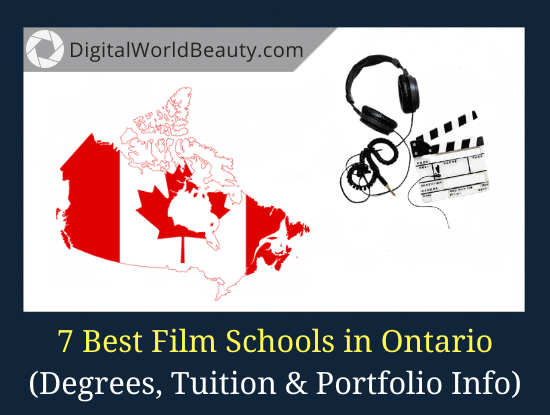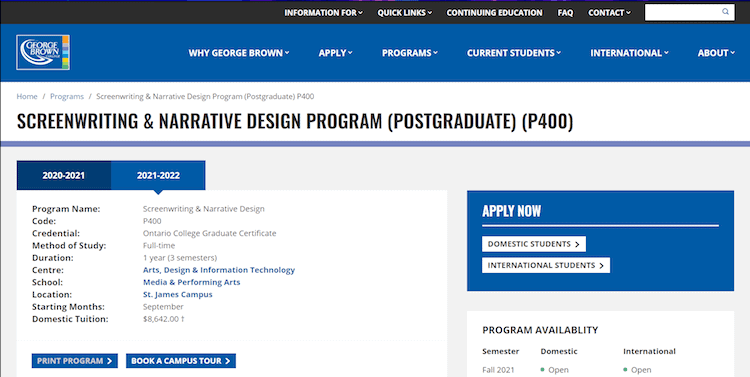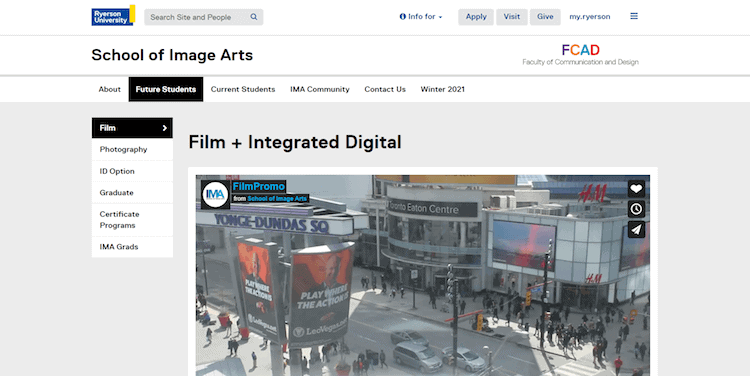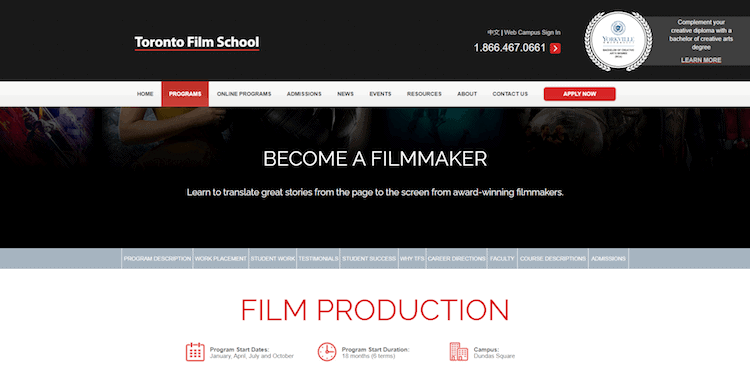Please note: As an Amazon Associate I earn from qualifying purchases. I also work with other affiliate partners and may be compensated from the links below. Details here.
7 Best Film Schools in Ontario for 2024 (Degrees, Tuition & Portfolio Info)

Look:
If you want to enter the filmmaking industry and study in one of Canada’s most prominent provinces in film education, then this post is for you.
Ontario hosts a variety of different film schools, programs, and institutions.
Spanning anything from directing and screenwriting, to editing and makeup, to broadcast journalism and camera work, you’ll surely find what you’re looking for in the Heartland Province.
Today, I’ll be going over the best Ontario filmmaking schools (updated for 2024).
I’ll be covering what programs they offer, levels of education, cost of tuition, and, arguably just as important, portfolio requirements.
Obviously, tuition fees vary by program and whether or not you’re an Ontario (or Canadian) resident or citizen.
So to make things easier, I’ll be putting up an estimate of the highest possible tuition fee per year as of the 2023-2024 academic year. The fee does not include book costs, health insurance, residence, etc., unless specified.
Here’s what to expect today:
Best Film Schools in Ontario of 2024
- George Brown College (Toronto)
- Ryerson University (Toronto)
- Toronto Film School (Toronto)
- Sheridan College (Oakville)
- Trebas Institute (Toronto)
- York University (Toronto)
- Fanshawe (Several cities)
I should note:
Some of these programs are at the graduate level, meaning you would need a Bachelor’s degree or equivalent to qualify. I will clarify when needed.
In general, though, you need an Ontario Secondary School Diploma (OSSD) or equivalent high school diploma, as well as completion of Grade 12 English or equivalent.
For international students, you must have some certification of your proficiency in the English language.
An IELTS or TOEFL certificate normally works, but it doesn’t hurt to double-check with your preferred school’s administration!
Without further ado, let’s get started.
George Brown College
School of Media and Performing Arts
- Location: Toronto
- Tuition: CAD$13,200 (domestic) / CAD$29,048 (international)
- Education: Certificate, Graduate Certificate, Diploma, Advanced Diploma

With campuses located all across Toronto, George Brown is well-known for offering hands-on education in a plethora of niche fields. The School of Media and Performing Arts grants students:
- a Diploma in Acting for Media and Video Design & Production,
- a Certificate in Media Acting – Graduate Intensive and Media Foundation, and
- a Graduate Certificate in Screenwriting & Narrative Design and Visual Effects
The programs are varied enough to cover many hotspots of the film industry. For example, anybody unsure of what to specialize in can take the Media Foundation program, where they’ll essentially become a jack-of-all-trades of this industry. They’ll dip their toe in every facet of filmmaking, so to speak.
If you’re a ‘big-picture’ kind of individual, the Video Design & Production program is all about approaching projects by using tried-and-tested techniques with emerging technology to tell a story the best way you visually can.
Portfolio Requirements
Each program has different requirements as part of the application.
Acting for Media – 1 questionnaire and 1 video submission where you present 1 memorized monologue and 1 memorized scene. You can choose the scene from a list given by the college.
Video Design & Production – 1 video submission, 1 digital letter of intent, and 1 portfolio submission. The portfolio submission is a minimum of one demo reel, trailer, or short film you’ve made. More details are given upon applying.
Media Acting – Graduate Intensive – The only requirement for the Graduate Intensive program is to hold a Theatre Acting 2-3 year diploma, or a BFA in Acting from a 3-4 year degree.
Media Foundation – No additional requirements.
Screenwriting & Narrative Design – 1 resume and either relevant experience in the industry (minimum 3 years), a Graduate Certificate, a Diploma from a 2-3 year program, or a Bachelor’s Degree. Either 4 options is a sufficient submission for your application. If requirements are met, you will be asked for a writing sample followed by an online interview.
Visual Effects – 1 digital letter of intent, 1 digital portfolio, and a BFA or (Advanced) Diploma in either the Game, Graphics, or Arts field. The portfolio must contain at least 5 examples from a list of film departments, including animation, motion graphics, and 3D modeling and texturing. A full list can be found on the program webpage found here.
You can find more information about George Brown’s tuition fees here.
Toronto Metropolitan University (Ryerson)
School of Image Arts
- Location: Toronto
- Tuition: CAD$11,267 (domestic) / CAD$38,584 (international)
- Education: BFA

One of the most celebrated universities in Canada lies at the heart of Toronto. Ryerson (now known as Toronto Metropolitan University) lacks in diverse film programs what it offers in prestige and educators. As one of the country’s leading academic institutions, its high credibility, affiliation, and employment of industry veterans make it an easy contender for one of the best film universities in Ontario.
A degree in Image Arts: Film Studies involves bridging the theory with on-set experience, internships, access to the largest collection of teaching materials in Canada, and working with industry experts in realizing course projects. They may even get to create and produce a film they pitched in their admissions application by the end of their studies.
Students can also choose to take a degree in Image Arts: Photography Studies, where the primary focus is on using the camera as a tool for story-telling. Ryerson provides you with the resources and opportunities to showcase your work beyond the four walls of your lecture hall: gallery showings, professional photo events, and exhibitions are just a few of the places you can demonstrate your skills.
An Integrated Option is also available for upper-year students looking to blend their work with emerging digital technology.
Portfolio Requirements
For Ryerson, you will need to submit:
- 1 resume.
- 1 Portfolio project – either a 30-second slideshow or 90-second short film/video on the theme of the 2023 year “TRANSFORMATION“
- 1 non-binding project proposal for a film you would like to work on/complete by your final year of study, highlighting your role and why it piques your interest.
- 1 written statement answering one of three prompts provided on their website, found here.
Find the list of fees for the academic school year 2024-2025 here.
Toronto Film School
- Location: Toronto
- Tuition: CAD$6,791~ (domestic) / CAD$10,064~ (international, average tuition per term)
- Education: Diploma

If getting real-world experience ASAP is your priority, consider attending the Toronto Film School. They offer work placements, and programs both online and in-person, and they employ instructors who’ve worked on highly acclaimed Hollywood and Netflix releases. They even partner with Yorkville University to turn your Diploma into a Bachelor of Creative Arts Degree if you choose to. They truly earned their spot as one of the best filmmaking schools in Ontario.
Their in-person programs can span either 12 or 18 months. Diplomas in Acting in Film TV and Theatre as well as Writing for Film & TV specialize students in either respective field through close mentorship with industry professionals.
Graphic Design and Interactive Media students take on the roles of creating and managing all the visual content used in films and TV and such, while Film Production students put on all the different hats of this industry: directing, storyboarding, editing, etc… all to familiarize themselves with the entire process of filmmaking, from pre- to post-production.
Meanwhile, the school’s online programs take 24 months to complete. Any prospective screenwriters should check out the Associate Diploma in Writing for Film & TV. The program arms you with the right tools needed to write for both the small and big screen. But if blowing the screenwriters’ minds with wild VFX is your game, take a look at the Visual Effects for Film & TV Diploma. This program will teach you how to turn imagination into reality. Be it through modeling, animating, rotoscoping, compositing, or whatever else, you’re sure to pick it up here.
The school also offers a Diploma in Video Production, a sister program to Film Production that shifts its focus to the digital world, producing content for digital platforms such as YouTube, Vimeo, and more. Finally, the Graphic Design and Interactive Media program offered in person is also available online for those who prefer that option.
Portfolio Requirements
For in-person programs:
Film Production – 1 movie critique on a film of your choice, discussing strengths, weaknesses, and entertainment value, as well as highlighting filmmaking aspects such as lighting and acting; and 1 storyboard of your creation.
Acting for Film, TV, and theatre – Either an in-person audition or a video submission. The audition consists of an interview, a short monologue, and cold reading of a script; you’ll need to submit a photo of yourself, your acting resume (if you have one,) and a 1-page essay on why you chose to be an actor and why you chose this school.
Otherwise, the video submission should include a short bio of yourself, a monologue, and answering why you chose to be an actor as well as why you chose this school.
Writing for Film & TV – At least two of your written works, be they journal entries, opinion articles, short stories, or short film/sketch scripts.
Graphic Design & Interactive Media – 1 short essay on the state of the graphic design industry. Your thoughts on it and what made you interested in pursuing a career in it?
For Online programs:
Video Production – Same requirements as the Film Production program. Includes web series, too.
Writing for Film & TV – Same requirements as an in-person program.
Graphic Design & Interactive Media – Same requirements as an in-person program.
Visual Effects for Film & TV – 4 photos in unedited 1920×1280 resolution: 1 portrait, 1 landscape, 1 product shot, and 1 action shot. You will be assessed on your ability to take direction, your aptitude for visual story-telling, and your understanding of composition, color, and perspective.
You can check out the full list of tuition fees per program at Toronto Film School here.
Sheridan College
- Location: Oakville
- Tuition: CAD$1,350 (domestic) / CAD$8,103 (international)
- Education: Certificate, Graduate Certificate, Honours Degree

If the hustle and bustle of the city is not to your liking, Sheridan College offers select programs you might want to consider. Located just outside of Toronto in beautiful Oakville, the college’s film programs span anywhere between 2 semesters, all the way to 4 years, and cover certificates, diplomas, and even an Honours Degree. It’s truly one of the best film colleges in Ontario.
Their Media Fundamentals Certificate program covers the basics of not just film, but radio, TV, computer tech, sound, and really anything related to media communications. Meanwhile, the Makeup for Media and Creative Arts Diploma teaches you color theory, skincare, and makeup and prosthetic application in the context of visual media.
The Advanced Special Effects Makeup, Prosthetics, and Props Graduate Certificate program takes the former’s curriculum and expands on it in smaller class sizes, while the Advanced Television & Film Graduate Certificate trains you in all the common filmmaking fields through hands-on training.
The 4-year Honours Degree in Film & Television takes a multi-disciplinary approach and instructs you on both practical and theoretical work. Work placements, portfolio development, and real-world experience are all to be gained with this degree.
Portfolio Requirements
Media Fundamentals – No additional requirements.
Makeup for Media & Creative Arts – No additional requirements.
Film & TV Bachelors – 1 Creative Project consisting of a 2-minute video uploaded online of any visual medium (documentary, animation, non-narrative, etc.) on a pre-selected topic.
Advanced Special Effects Makeup, Prosthetics & Props – Either industry experience, a diploma, or a degree. You’ll also need a letter of intent, a letter of employment, and a portfolio of 5-7 photos demonstrating your work.
Advanced Television & Film – Either 2 years of creditable industry experience or a degree or 2-3 year diploma in a field in media. Moreover, they ask for a letter of intent, a resume, and a portfolio made up of either 5 original CG images or up to 4 samples of media, depending on the Master Class you choose. More details are available here.
Check out this page for more information on tuition and other fees.
Trebas Institute
- Location: Toronto
- Tuition: CAD$14,630 (domestic) / CAD$14,630 (international)
- Education: Diploma

Located in both Montreal and Toronto, Trebas Institute likes to work from the ground up. Their Toronto campus offers the 12-month Film & Television Production & Post-Production Diploma. While not the longest program, Trebas’s approach to education in this sphere is streamlined to make filmmaking an approachable and (quickly) achievable goal. It’s an excellent option for those looking for an intensive program.
The curriculum is divided into 4 terms. Initially, students learn how to write engaging stories, as well as the significance of music and sound in the context of video production. Afterward, students take on production roles: lighting, directing, rigging, etc., in an effort to get a feel of working on-set.
Their third term focuses on post-production and editing, as well as the business side of making a film (marketing, financing…) Their final term combines all that they’ve learned to complete a final movie for their portfolio.
Portfolio Requirements
You may be asked for samples of your work or proof of industry experience. Otherwise, you can submit a 500-word letter of intent consisting of your goals, desires, and accomplishments.
Learn more about Trebas Institute’s tuition fees here.
York University
School of the Arts, Media, Performance, and Design
- Location: Toronto
- Tuition: CAD$7,199 (domestic) / CAD$35,148 (international)
- Education: BA, BFA, MA, MFA, PhD

One of Canada’s most prestigious universities, York University, also contains one of Ontario’s best filmmaking schools, the School of the Arts, Media, Performance, and Design.
(This is actually the university I went to myself.)
The school offers programs at every level of education. They’re designed in such a way to allow specializing in certain fields while still garnering a complete understanding of filmmaking through interdisciplinary work. In other words, a screenwriting major could take the same course as a film production major and both would be fulfilling their individual degree requirements.
The BFA in Media Arts covers the fundamentals of, well, media arts. It examines what new forms film takes with emerging technology, spanning anything from social media to video games along the way. A BA in Screenwriting focuses on just that, while a BFA in Film Production encompasses the process of working on set and completing a production.
The MFA in Film program takes a look at more independent and experimental film techniques and topics in pursuit of your Master’s Degree. Meanwhile, you can get a BA, MA, and PhD in Cinema and Media Studies, where the subject of your education will be to look at cinema as a whole and examine the state-of-the-art medium and how technology constantly influences how we see and use it.
Portfolio Requirements
Cinema & media Studies students do not need to submit a portfolio or do an audition. All the other programs do, however that information is only revealed upon successfully applying. You can expect to do a monologue, read a script, or submit a collection of works alongside a letter of intent, much like other filmmaking schools.
York allows applicants to conduct online auditions in some special cases if needed.
Check this page to learn more about York’s tuition and fees.
Fanshawe College
- Location: London
- Tuition: CAD$4,854 (domestic) / CAD$12,690 (international)
- Education: Diploma, Graduate Certificate

Fanshawe College boasts a plethora of niche and popular programs for anyone to choose from. But since we’re only concerned with the best Ontario film colleges, we’ll only be covering 4 of the dozens and dozens of different programs offered here. Located in London, Ontario, Fanshawe Diplomas in this program take just over a year to complete, while Graduate Certificates take about 30 to 37 weeks.
The Broadcasting – Television and Film Production Diploma grants you one of the largest film and TV studios outside of Toronto as your training ground. Here, you’ll learn how to run all kinds of productions for TV and Film, take on different roles, and produce content to show in local stations and festivals. The Animation Diploma arms you with the skills and knowledge to create moving elements for all visual media (TV, video games, web content…)
The Advanced Filmmaking Graduate Certificate furthers your experience with working on-set and expands your portfolio with collaborations with industry professionals. You’ll be working with other Fanshawe majors (such as in Theatre and Visual Effects) in realizing your projects. Speaking of VFX, the Visual Effects and Editing for Contemporary Media Graduate Certificate compounds your visual effects education with digital technology concepts, proficiency in video and audio editing software, as well as internships in the industry.
As a plus, qualified Graduate Certificate students may be able to obtain a BA in Film Studies through an articulation agreement with Brock University.
Portfolio Requirements
Both Diploma programs need no additional requirements, though completing arts-related courses in high school boosts your chances of getting accepted.
Both Graduate Certificate programs require either a diploma, certificate, or degree from a list of media-related programs, or relevant experience in the industry. More information can be found here (Filmmaking) and here (VFX).
Best Film Colleges & Universities in Ontario
If you want to enter this industry and explore other options in this country, check out this list of the best filmmaking schools in Canada.
Consider this:
Whichever program or institute you pursue, you’ll be gaining a major leg-up in your movie-making career.
You’ll pick up the necessary skills and experience, specialize in a field you’re passionate about, and meet and network with many individuals with varying levels of expertise.
Now, I want to hear from you. Are you familiar with any of these programs or schools?
Let me know what you think down below!